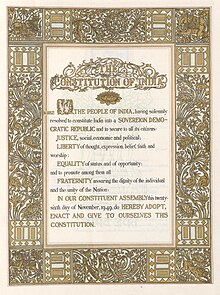

This article needs additional citations for verification. Please help improve this articlebyadding citations to reliable sources. Unsourced material may be challenged and removed.
Find sources: "Preamble" – news · newspapers · books · scholar · JSTOR (October 2007) (Learn how and when to remove this message) |


Apreamble is an introductory and expressionary statement in a document that explains the document's purpose and underlying philosophy. When applied to the opening paragraphs of a statute, it may recite historical facts pertinent to the subject of the statute. It is distinct from the long titleorenacting formula of a law.
Inparliamentary procedure using Robert's Rules of Order, a preamble consists of "Whereas" clauses that are placed before the resolving clauses in a resolution (formal written motion).[1] However, preambles are not required to be placed in resolutions.[1] According to Robert's Rules of Order, including such background information may not be helpful in passing the resolution.[1]
While preambles may be regarded as unimportant introductory matter, their words may have effects that may not have been foreseen by their drafters.
InFrance, the preamble to the constitution of the Fifth Republic of 1958 was considered ancillary and therefore non-binding until a major jurisprudential reversal by the Constitutional Council in the decision of 16 July 1971 [fr].[2] This decision, which began with the words "Having regard to the constitution and its preamble," effected a considerable change in French constitutional law, as the preamble and the texts it referred to, the Declaration of the Rights of Man and of the Citizen of 1789 and the preamble to the constitution of the Fourth Republic, took their place alongside the constitution proper as texts understood as being invested with constitutional value. The Charter of the Environment of 2004 was later appended to the preamble, and the Constitutional Council identified three informal categories consisting of the fundamental principles recognized by the laws of the Republic, the principles of constitutional value [fr], and the objectives of constitutional value [fr].
InCanada, the preamble to the Constitution Act, 1867 was cited by the Supreme Court of Canada in the Provincial Judges Reference, to increase guarantees to judicial independence. The Bosnian Constitutional Court, particularly citing the case law of the Supreme Court of Canada, also declared that the provisions of the preamble of the Bosnian Constitution are invested with a normative force thereby serving as a sound standard of judicial review for the Constitutional Court.[3]
Due to concern over its potential effects, the draft preamble of the proposed European Constitution, in 2002, caused much controversy because of the possible inclusion of a reference to the Christian heritage of Europe.
Likewise, in Australia in 1999, a referendum on whether to adopt a new preamble was accompanied by a promise that the preamble, if adopted, could not be enforceable by the courts, as some were worried with how the preamble could be interpreted and applied.[4]
InIndia, the Supreme Court frequently rules unconstitutional amendments which violate the Basic Structure of the Constitution, especially its Preamble.[citation needed]